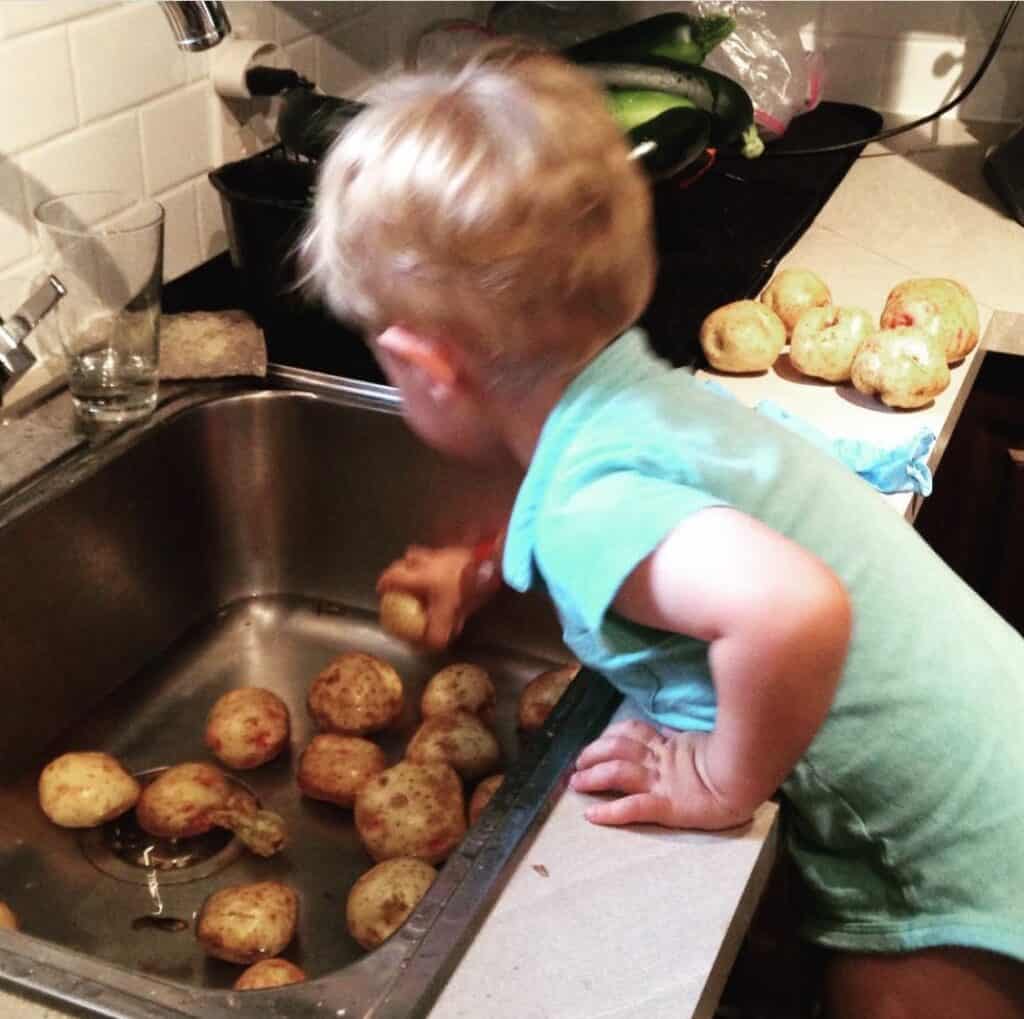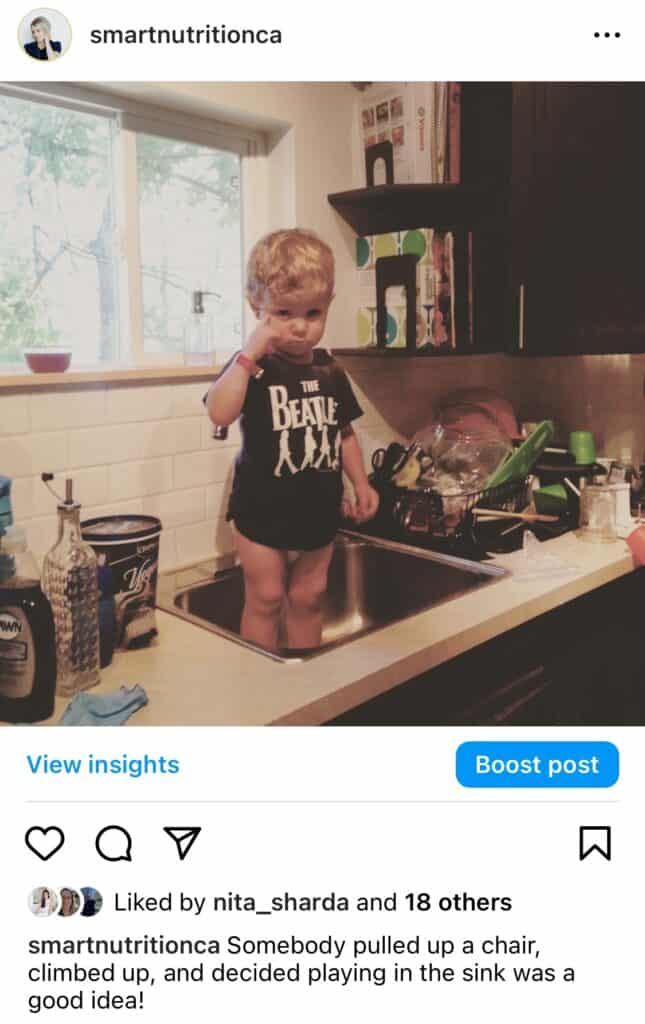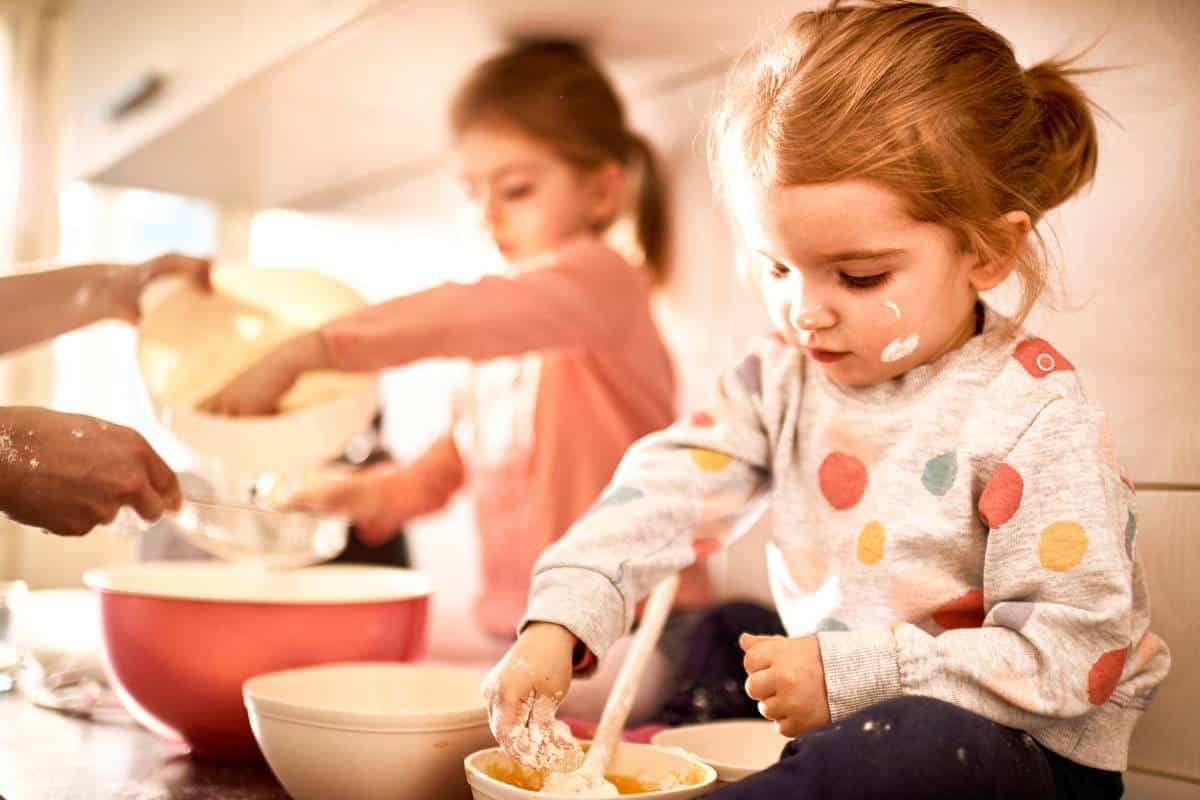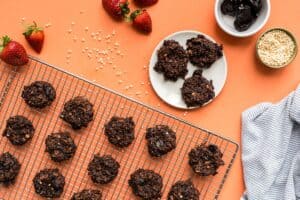Did you have that feeling when you had a newborn…maybe you were in the kitchen putting something together and thinking about that moment they can help you in the kitchen as your sous-chef? Except, now the time has come and it is completely overwhelming to think about your tiny human being in the kitchen space with you? Yeah, we get it. We’ve been there and we’re still there.
In this blog post, we are chatting with you about the chaos, glory anddddd what the research has to say about involving your kids in the kitchen.
Is it worth it? What are the benefits? How can I meet my needs and child’s need for curiosity? We’ll get into all that fun stuff.

What Are the Benefits of Fostering Food Skills at an Early Age?
Have you ever heard the proverb that goes like this: “If you give a man a fish, you feed him for a day. If you teach a man to fish, you feed him for a lifetime.” We want you to keep this in mind except the idea is, if we take time to teach our children valuable life skills like cooking and preparing food, in essence, we teach them to be able to nourish themselves when they are fully fledged adults.
It might be hard to imagine how all of this will pay off so far into the future, but your child will actually learn a lot right now from the time they spend with you in the kitchen.
7 Things Your Toddler Will Learn From Cooking With You:
- Fine and gross motor skills: picking up objects, slicing produce, mixing batters, sprinkling (pre-measured) spices into recipes, scooping and pouring water into a pot all require motor skills
- Increased comfort with new and familiar foods – children are more likely to try foods if they’ve been involved in the preparation, there’s a whole new level of intrinsic motivation they can tap into
- Organization skills when putting together a recipe
- Social skills – your child will be working with you or another caregiver spending quality and meaningful time together; as well, learning the basics of sharing, taking turns, and cooperation
- Numeracy and math skills – If you’re using measuring utensils, your child will get the chance to develop more familiarity with numeracy, adding, and fractions
- Reading skills – Pointing to different words or letters will engage their literacy skills and develop their speech
- Science skills – Yes! You can absolutely sneak in some education around food chemistry and physical changes

Is it Safe to Include My Child in Meal Preparation?
Short answer: it depends.
Long answer: being in the kitchen where there are sharp tools, potentially dangerous appliances, and hot ingredients or a stove can all pose an inherent risk to the safety of anyone in the kitchen.
Do we let this prevent us from creating impactful interactions in the kitchen? Personally, not in our houses.
Instead, empower yourself to decide what is and isn’t safe when you have your children assisting you in meal preparation. For example, you can be the one to drop items into a boiling pot of water but they can stir afterwards with your assistance. We have a dietitian friend named Erin. She made up a cute rhyme with her children that goes like this: “Things on the stove are hot hot hot. Do we touch them not not not. Hot hot hot. Not not not.”
When it comes to sharp items, instead of offering them an adult knife, provide a child-friendly knife and teach your child how to best protect their little fingers. Blenders, food processors and even cheese shredders or peelers can be quite sharp, so it’s important to keep these away from children or ensure there is parental supervision.

How Can I Involve My Baby in the Kitchen?
In the early months with a young baby, there likely isn’t a whole lot they can help with. But, having your child nearby can be a supportive way to have them gain comfort with the kitchen space. This really will depend on the size of your kitchen too – it might not be practical to have your baby in your space. Another suggestion is to wear your baby as you prepare meals. This can introduce them to the smells, sights, and sounds of the food you cook even before they’re developmentally ready to eat it. It’s all about exposure! Again, safety will be important!
If your baby is at the age where they’re sitting or standing, they can definitely help you drop items into a bowl, sort through ingredients, stir batter, look at pictures in a recipe book or toss veggies in oil with their hands prior to roasting.
Alternatively, you can give them fake tasks, like whisking water in a measuring cup or taking the peel off an onion while you’re completing the real meal prep. This gets them familiar with things in the kitchen while getting you in the habit of involving them!

How Can I Involve My Toddler in the Kitchen?

We want to preface this section of the blog post by honoring how challenging it can sometimes be to have your toddler in the kitchen space. Toddlers are wildly imaginative, enthusiastic, can be unruly, and have a tendency to think they can take on all tasks – including dangerous ones – with their new-found independence. Deep breaths!
That being said, funnel that enthusiasm into toddler appropriate tasks in the kitchen! A younger toddler can:
- Dump ingredients
- Mix ingredients
- Pour liquids
- Knead dough
- Use safety scissors (to slice pancake, meats, or noodles)
- Sort
- Wash/scrub ingredients
- Arrange toppings (example: on a pizza)
- Press buttons on machines with an adult
- Add liners to muffin tins
Meanwhile, an older toddler can:
- Crack an egg (watch out for egg shells!)
- Measure
- Cut/slice ingredients
- Flip
- Assemble meals such as layering lasagna, sandwiches, casseroles, tacos, etc.
- Use a rolling pin
- Roll balls (example: oatmeal balls)
- User a cookie/muffin scoop
- Rip lettuce
- Help with using a can opener
- Help set the table
There you have it, all the reasons you should and might want to consider having your kiddo in the kitchen and truthfully…there are very few reasons you shouldn’t. Early introduction into the kitchen means early introduction to a major life skill–food preparation.
Trust us, we’re in it with you. It can seem like more “work” to have your kids in the same kitchen space as you, but whatever it looks like for you, honor it. Every little bit counts!
Want a great starter recipe for involving your kids in the kitchen? Try these toddler friendly oat balls! Your toddler can help dump ingredients into the bowl, stir, and roll the balls.







4 thoughts on “Together in the Kitchen – Why It’s Important to Cook with Your Toddlers”
My toddler loves to help in the kitchen. And I still often am hesitant with full meal preparation but we love to bake. Often we make baked oatmeal’s for breakfast and other bar/loads that can be over mixed, the measurements are not super critical and are successful no matter what.
People will say they are worried about her taste testing as we go, and yes I redirect her but I do not get upset or stop the activity. I think people forget that living in Canada our eggs are pasteurized and the amount they will actually taste of flour or eggs won’t hurt them.
Hi Kaitlyn!
That’s awesome that your toddler loves to help in the kitchen! It’s so fun to see them enjoy the food prep process.
One thing to note: not all eggs in Canada are pasteurized, only the ones that are pre-shelled in a milk-type carton. Whole eggs undergo a cleaning process but they’re still raw and there’s still a small risk that they’re contaminated with a food poisoning causing bacteria. For small children, whose bodies are small and have developing immune systems, the dose that would lead to getting sick is smaller than it would be for an adult.
very nice article really informative..
Thanks for piping in! We’re happy you found it helpful.